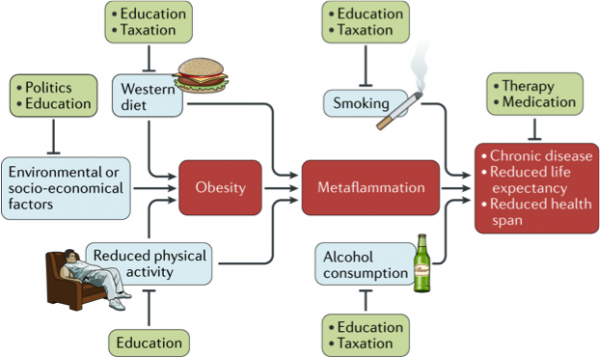Today we want to explore a condition that is relatively new called Metaflammation and how the Western Diet (WD) and sedentary behavior can influence it.
But first we want to check in with you and see how you’re doing. Please say say hi and let us know where you’re reading from.
Also, share the #1 thing you’re doing during quarantine to manage your stress. What is your one NON-NEGOTIABLE?
Ok, let’s jump in…
WHAT IS METAFLAMMATION?
The short definition is:
Chronic inflammation orchestrated by (linked to) metabolic cells in response to excess nutrients and energy. Generally low-to-medium grade & systemic.
WHY IS THIS IMPORTANT??
Left unchecked, Metaflammation is the major common cause underlying chronic progressive conditions such as metabolic syndrome, heart disease and diabetes.
WHY IS THIS A CONCERN FOR YOUR IMMUNE SYSTEM?
There is something even more sinister occurring regarding the relationship between Metainflammation and the Immune System. Essentially, Metaflammation is recognized as a threat to the person, wherein a part of the Innate Immune System becomes “trained” against it.
WHAT CAUSES METAFLAMMATION?
Well, the good news is it is caused by two lifestyle choices we can control: what we eat and how much we exercise.
The Western diet and sedentary behavior cause Metaflammation. “Chronic consumption of a Western diet along with sedentary behavior causes chronic Metaflammation and is ‘memorized’ by innate immune cells through long-lasting metabolic and epigenetic cellular reprogramming”.
So, a portion of your innate immune system is actually devoted to waiting for the next intake of Western Diet, and then responding towards the Metainflammation it creates.
Because your immune system is finite, this use of resources towards it makes you more susceptible to other opportunistic diseases/threats.
WHAT IS THE WESTERN DIET / SEDENTARY BEHAVIOR?
The Western Diet is characterized by a high intake of saturated and omega-6 fatty acids, reduced omega-3 fat intake, an overuse of salt and too much refined sugar.
Sedentary-to-light activity behavior is defined as sitting, lying down, and expending very little energy (approximately 1.0-1.5 metabolic equivalents [METs]), and light-intensity activity, such as standing, self-care activities, and slow walking, which require low energy expenditure (approximately 1.6-2.9 METs)

Fig. 1 / Reference 3
CALL TO ACTION / TAKEAWAYS:
1) Metaflammation underlies all chronic non-communicable diseases and ties up part of the immune system in a trained response
2) Get a whole food Nutrition Plan or, put simply, eat REAL FOOD. Real food doesn’t have a label on it.
3) Get an Exercise plan and utilize an activity monitor like a Fitbit to ensure you’re active enough.
If you need help getting started with either or both of these actions, that is what we are here for. You can schedule a Success Strategy Session by CLICKING HERE and choosing a time that is convenient for you. Totally free / no obligation, we’ll just talk about your goals and see if we are a good fit to help you.
Take care and be safe.
We are on a MISSION to help over 40 high level professionals and entrepreneurs to conquer stress so that they can live their best life. Download our FREE guide REJUVENATE: 24 Techniques to Beat Stress.

Enter your name and email to tell us where to send it!
References:
(1) https://www.ncbi.nlm.nih.gov/pubmed/28930657 (2017) Foundations of Immunometabolism and Implications for Metabolic Health and Disease.
Conclusions
As we have discussed here, careful observations and experiments in animal models and cellular systems have revealed that metabolism and immunity are inextricably interwoven. Research in this field has accelerated over the last two decades (Figure 2), and it has become increasingly clear that overlapping and redundant inflammatory pathways play pleiotropic and important roles in metabolism and that the metabolic state is a critical determinant of immune function. We have learned that components of both the innate and adaptive immune system modulate metabolism, and we have identified key molecules that drive the cellular and systemic responses to nutrients. Most relevant to the current global obesity epidemic, we are now learning how these networks are re-wired in response to the stress imposed by chronic nutrient excess and predispose individuals to a broad array of complications such as diabetes. This excellent progress should allow us to overcome the challenges of designing effective therapeutic and disease preventative strategies at the immune:metabolic interface to improve human health.
Discussion
Genetic and lifestyle factors are key drivers of chronic non-communicable inflammatory diseases, which currently represent the vast majority of death burden in Western societies (Mega et al., 2015). Importantly, an unhealthy lifestyle, which includes factors such as noxious diets, little exercise and sleep, and unfavorable environmental triggers, can independently of the genetic risk strongly increase the rate of incident cardiovascular events and increase the susceptibility for other chronic inflammatory diseases (Khera et al., 2016). Therefore, it is of great importance to better define how these factors mechanistically influence inflammatory processes.
Alterations in diets can have deleterious effects on immune responses and drive the development of a range of inflammatory diseases (Thorburn et al., 2014). Yet, whether and how “inflammatory” diets can provoke trained immunity leading to potentially long-lasting alterations of immune responses was unknown. Early studies documented that WD feeding of rabbits induced enhanced cytokine production toward LPS stimulation in cells within the aortic tissue suggesting that WD could prime for augmented innate immune responses (Clinton et al., 1991, Fleet et al., 1992). Here, we have investigated whether WD consumption can trigger trained immunity and whether this results in modified secondary immune responses in a mouse model for atherosclerosis, ….. Our studies revealed that while WD provoked only transient systemic inflammatory responses, it led to long-lasting alterations of myeloid cell responses toward different innate immune stimuli. These studies thus establish that not only microbes but also complex sterile inflammatory triggers, such as a WD, can induce trained immunity.
Abstract
Chronic consumption of a Western diet along with sedentary behaviour causes chronic metabolic inflammation (termed metaflammation) and is ‘memorized’ by innate immune cells through long-lasting metabolic and epigenetic cellular reprogramming. Lifestyle-associated pathologies have reached epidemic proportions and require a better understanding of the causes of metaflammation and ways to translate this to measures that protect the public from unhealthy diets. Lifestyle-associated pathologies have reached epidemic proportions and urgent action is needed to protect the public from unhealthy diets. Here, the authors describe how the Western diet has long-lasting effects on the immune system that promote chronic metabolic inflammatory diseases.
“the Western diet appears to be mistakenly recognized by the organism as a threat”
Abstract
Immune memory is a defining feature of the acquired immune system, but activation of the innate immune system can also result in enhanced responsiveness to subsequent triggers. This process has been termed ‘trained immunity’, a de facto innate immune memory. Research in the past decade has pointed to the broad benefits of trained immunity for host defence but has also suggested potentially detrimental outcomes in immune-mediated and chronic inflammatory diseases. Here we define ‘trained immunity’ as a biological process and discuss the innate stimuli and the epigenetic and metabolic reprogramming events that shape the induction of trained immunity
Abstract
Type 2 diabetes mellitus and hypertension are the most common comorbidities in patients with coronavirus infections. Emerging evidence demonstrates an important direct metabolic and endocrine mechanistic link to the viral disease process. Clinicians need to ensure early and thorough metabolic control for all patients affected by COVID-19.


